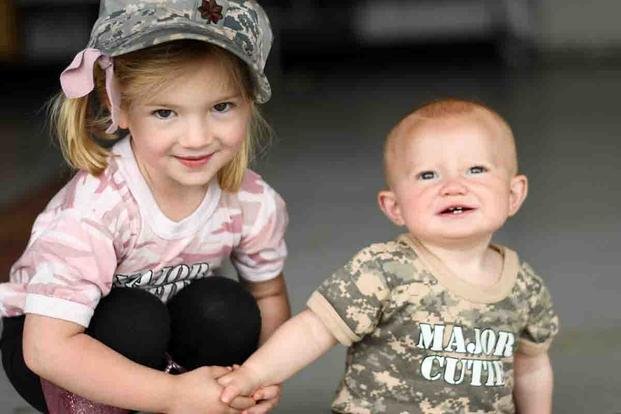Military children, affectionately known as "military brats," grow up in a unique environment with unique challenges. Their parents deploy, spending months and years away from home, and they move much more often than civilian families and often grow up in the culture of the military.
Every April, the U.S. military celebrates its estimated 1.2 million military children around the globe with the Month of the Military Child. The best way to help people prepare for and join in on that celebration is curating some of the most unique facts about military children.
1. They're called "military brats" for a reason.
Before anyone starts emailing me about calling military children "brats," know that everyone used this term for them, including military brats themselves. It's a term of endearment and might be at least 100 years old.
In 1921, British Regiment Attached Travelers (as they were called) traveled abroad with British troops. BRAT soon became a term only for children of those troops. The name just stuck and, since it's obviously so perfect, was adopted elsewhere, including the United States.
2. There are more children than service members.
Since the 1970s, military families have grown so much that military children now outnumber actual U.S. troops by a ratio of 1.4 to 1. Sure, it's not a huge margin, but it tells you that military children and families are important to service.
According to the Department of Defense, the number will only grow. Active-duty service members are having kids younger and more often, as the average age of a military child is not five years old.
3. Military children are twice as likely to join the military.
For years, the media have been referring to the military as a "family business." They call it that because military children are not only twice as likely to join the military when they become adults, but also because as of 2016, 80% of troops who joined the military between 2012 and 2013 came from a family with at least one military-connected family member.
4. Deployments are hard on children, too -- and have long-term consequences.
In a 2019 study, researchers found children of deployed parents have higher rates of mental-health issues, compared to civilian children. The biggest differences between the two groups were features of anxiety and depression, likely stemming from worries about their parent's safety. The actions of the non-deployed parents also have an effect on military children.
The way the parent who isn't deployed handles their partner's absence shows in their children, especially external reactions, such as aggressive behavior. These reactions can manifest in the children. The greater the danger faced by the deployed parent, the more pronounced these impacts can be.
5. Military children are resilient -- and grow up to be resilient adults.
A survey conducted by the University of Texas found that despite the challenges they face in frequent moves and dangerous deployments, military children have healthy relationships with others, do well in school and are engaged in community activities.
Moreover, they also show more tolerance, resourcefulness and respect for authority. The challenges they face as a part of their youth helps prepare them for adversity throughout their lives. As a result, they adapt to change more quickly and easily than others.
-- Blake Stilwell can be reached at blake.stilwell@military.com. He can also be found on Twitter @blakestilwell or on Facebook.
Want to Learn More About Military Life?
Whether you're thinking of joining the military, looking for post-military careers or keeping up with military life and benefits, Military.com has you covered. Subscribe to Military.com to have military news, updates and resources delivered directly to your inbox.






















